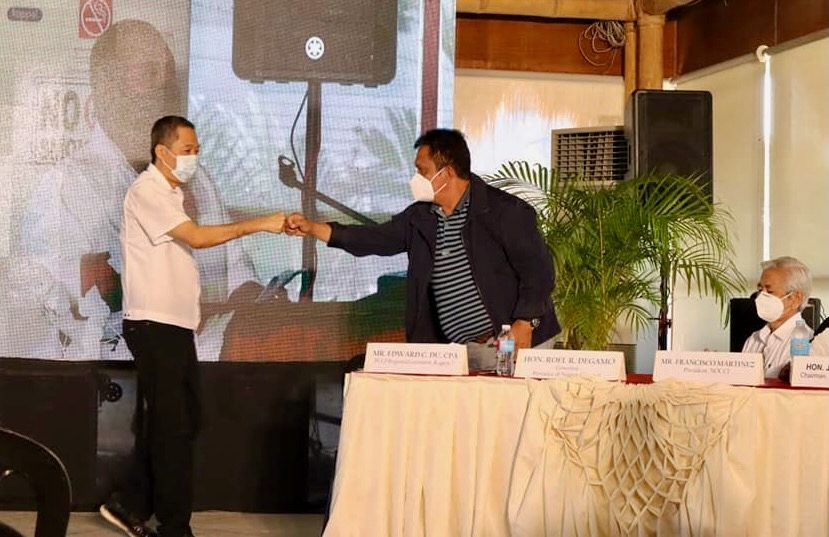SUMMARY
This is AI generated summarization, which may have errors. For context, always refer to the full article.

The province of Negros Oriental launched on Friday, January 28, the country’s first local Clean, Renewable Energy (RE) ordinance.
Governor Roel R. Degamo signed the landmark ordinance, which the province called the RE Code, on January 11. The Sangguniang Panlalawigan, led by Vice Governor Edward Mark L. Macias, unanimously passed it on December 23, 2021.
San Carlos Diocese Bishop Gerardo Alminaza, a environmentalist and fierce opponent of coal-fired power plants, called the ordinance historic.
“It not only prohibits the construction of all fossil fuel power plants, but also commits to phasing-out the use of fossil fuels in a timeline compatible with the 1.5-degree Celsius goal of the Paris Agreement,” Alminaza said in a statement
“This is a prohibition that cannot be overturned except by a majority of the residents of Negros Oriental,” the bishop stressed. “This ensures that the welfare of our people, environment, and climate are not compromised by political whims, short-term gains, and self-interests of the few.”
Ordinance No 30 (Series of 2021) applies to “all power generation, transmission and distribution projects” in the province.
Section 16 of the Code states that no fossil fueled power plants will be constructed in Negros Oriental.
It also states that the prohibition shall remain unless a majority of the residents, through a referendum, petition for its lifting, with the Sangguniang Panlalawigan passing the petition and governor approving it.
“Indonesia and the Philippines have the potential to be pioneers in the process of removing coal from our region’s energy mix,” said Asian Development Bank President Masatsugu Asakawa.
Incentives
The RE Code is the first ordinance that provides incentives for clean energy investors.
It encourages all eligible institutions and companies to avail of the government’s Green Energy Option Program (GEOP).
The GEOP allows power consumers with a monthly consumption of at least 100 kilowatts to get electricity directly from a renewable energy source of a licensed GEOP provider.
The CODE encourages RE developers to create a tourism component and offers a one-year tax holiday for these projects.
It also requires all tourism-related businesses to participate in the GEOP and announce their adherence through announcements in traditional and social media.
The Code gives priority to RE projects in terms of land-use and right of way processes.
It provides that all carbon credits earned by the developer shall be shared equally with the province and the host local government
An RE council will be formed to pursue policy-making that will accelerate RE development programs for a greener, energy self-sufficient, and sustainable province.
Persistent struggle
Edward Du, former president of the internationally-awarded Negros Oriental Chamber of Commerce and Industry (NOCCI) proposed the RE code.
Provincial Board Member Jose A. Baldado, the chairman of the Sangguniang Panlalawigan Environment and Energy Committee, authored the ordinance.

Alminaza praised the province’s officials for prioritizing “the people’s right to a balanced and healthful ecology.”
But he also underscored the role activists played in prodding officials to make a stand against dirty energy.
“This piece of legislation is also a fruit of Negrosanons’ relentless resistance against destructive energy,” said Alminaza.
“For over two decades, our people took down at least five coal-fired power plant projects proposed in various towns across this island,” said the bishop. “This was done to protect generations present and to come from the destruction that comes along with coal operations, which many communities in other parts of the Philippines are unfortunately forced to suffer today.”
The launch in Sidlakang Negros Village, Dumaguete City, caps a series of environmental initiatives by the provincial government.
Governor Degamo signed and released Executive Order 9, declaring Negros Oriental a clean energy province on March 28, 2018 – effectively banning the construction of coal-fired power plants.
In December of that year, he also signed an executive order declaring March 5 a renewable energy day.
In November 2021, the Asian Development Bank (ADB) urged Indonesia and the Philippines to retire coal-fired power plants.
A year before the ADB statement, Alminaza urged banks to stop giving loans for dirty-fuel power projects. – Rappler.com
Add a comment
How does this make you feel?
























There are no comments yet. Add your comment to start the conversation.